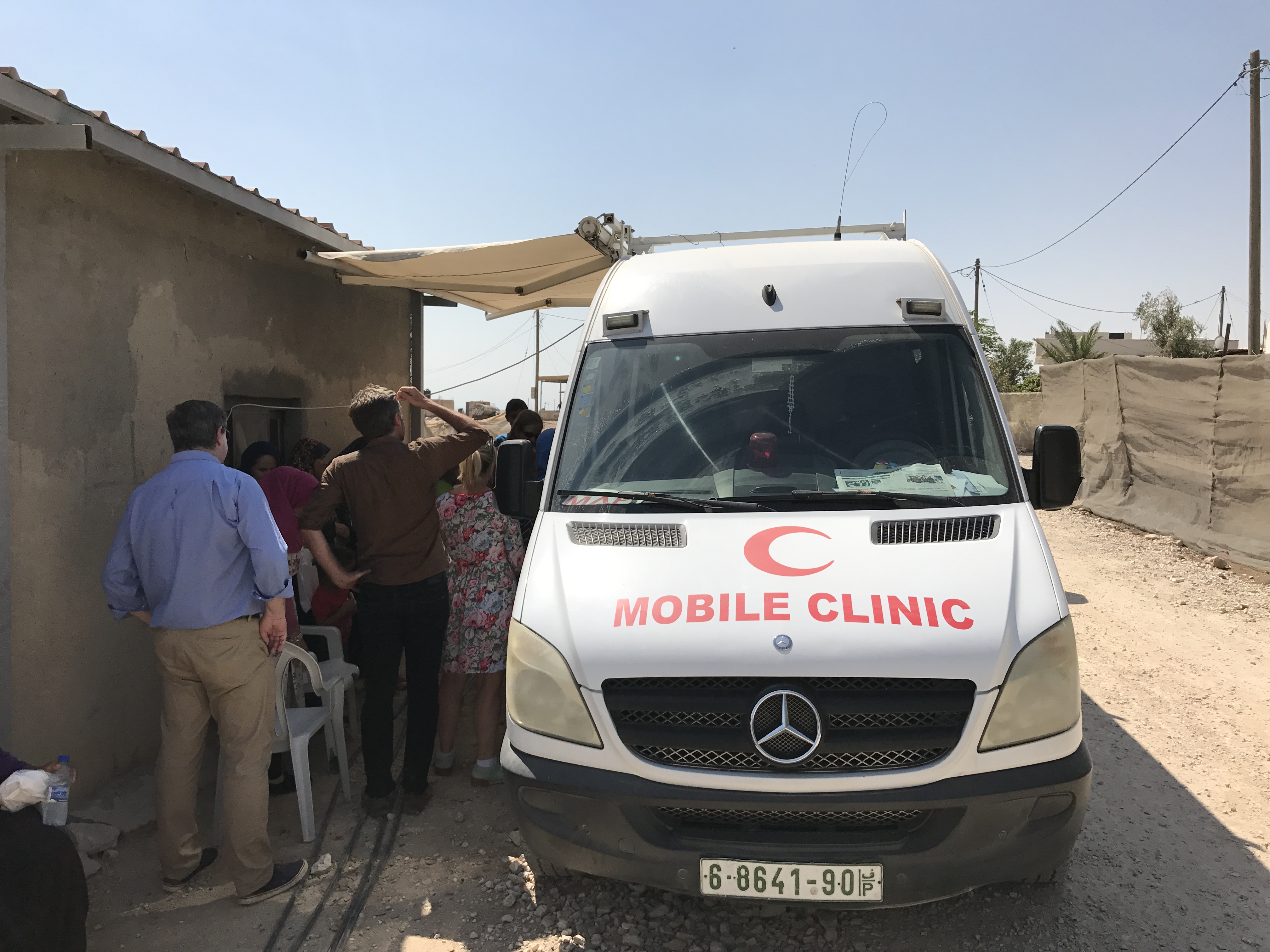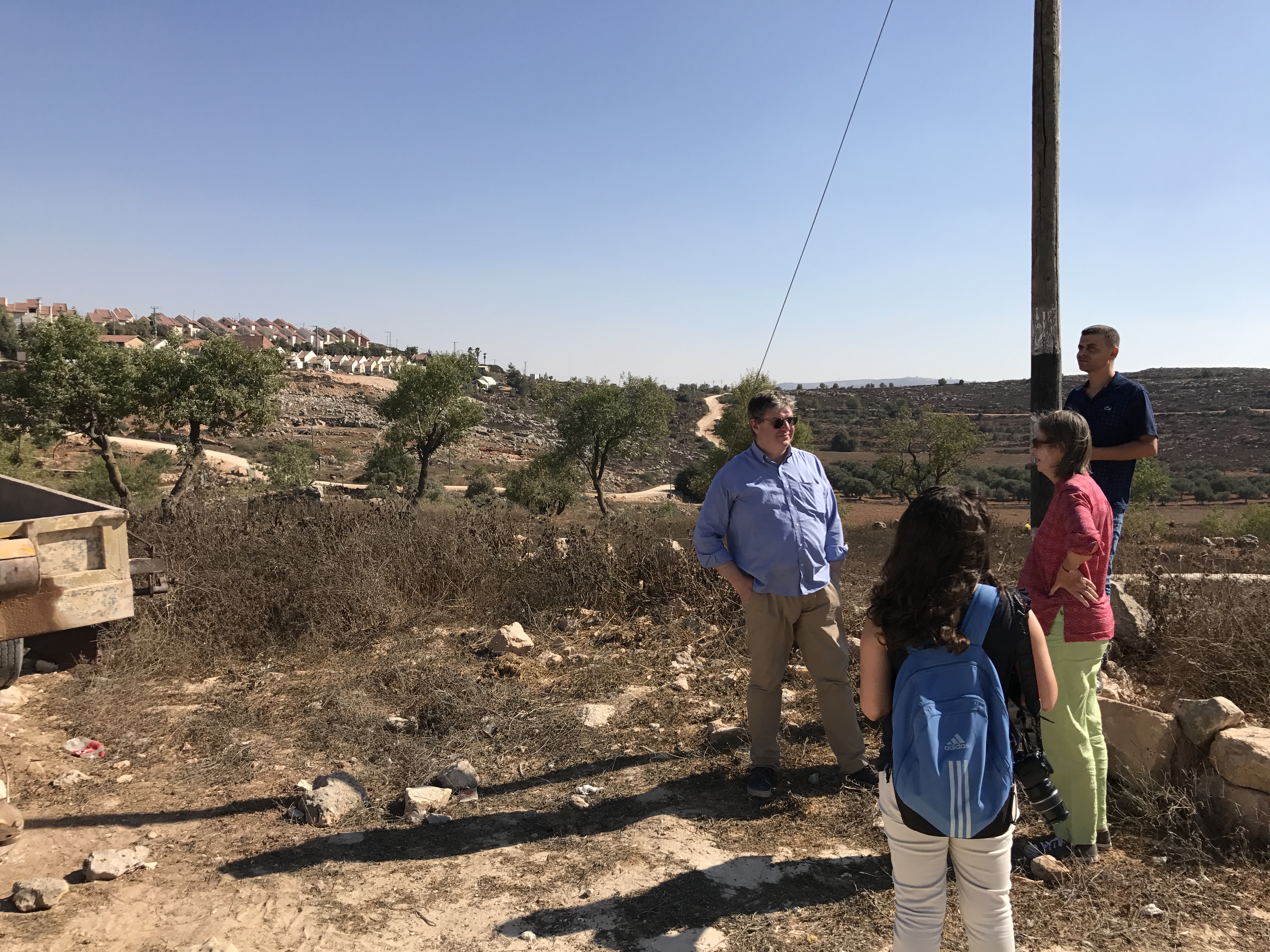A Caabu-Medical Aid for Palestinians (MAP) Parliamentary delegation recently returned from the West Bank. The delegation from 28 August – 1 September 2017 included former Labour Minister for Education and Minister for the Arts, Baroness Tessa Blackstone, Labour MP for Batley and Spen and Shadow Minister to Early Years, Tracy Brabin, and former Secretary of State for Scotland, former Government Deputy Chief Whip and Liberal Democrat MP for Orkney and Shetland, Alistair Carmichael.
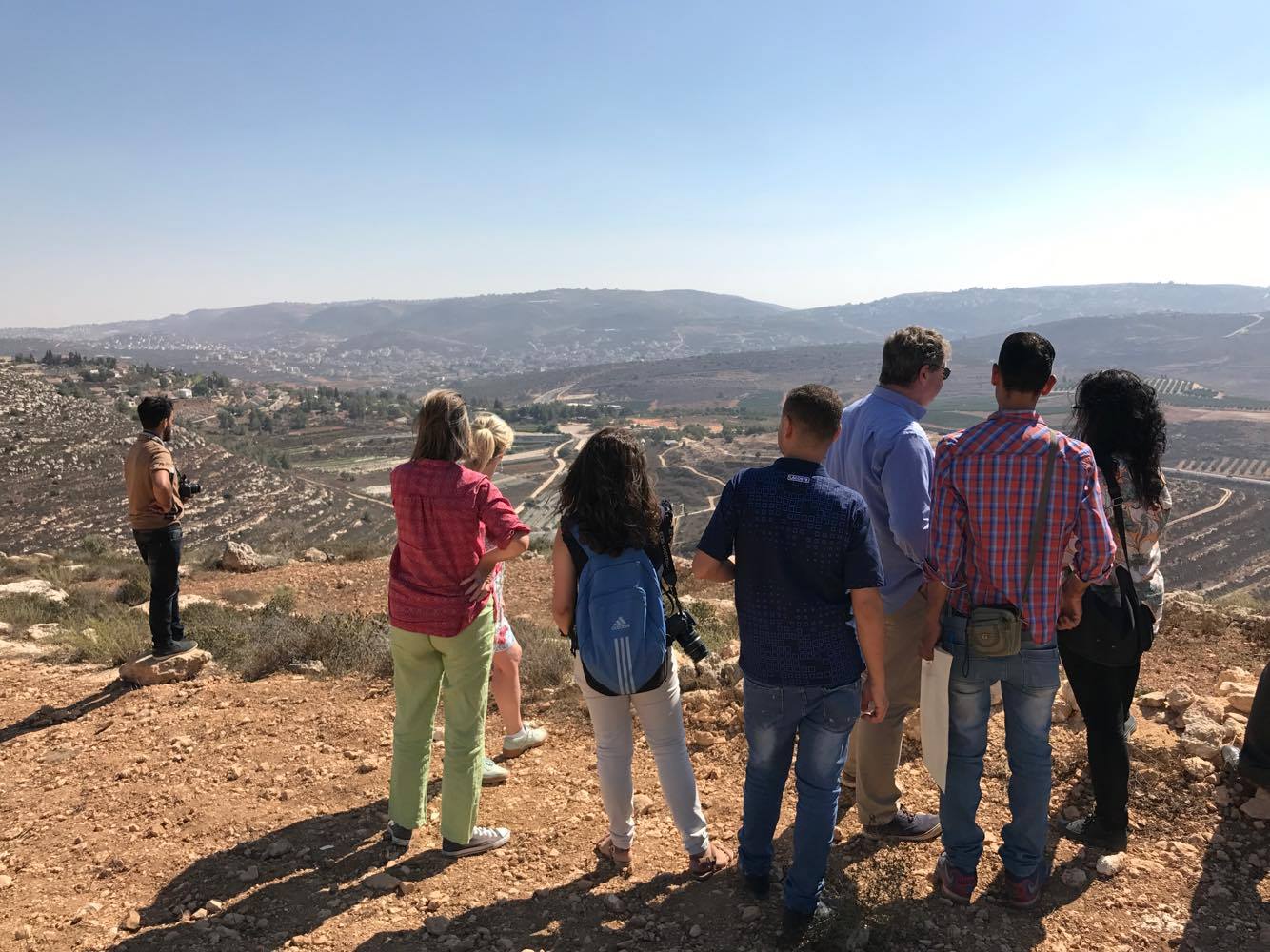
The delegation had meetings with officials, the British Consulate in Jerusalem, the British Embassy in Tel Aviv and was briefed on the current situation in the West Bank and Gaza by the UN.
Meetings were also had with Save the Children, Diakonia, AIDA (Association of International Development Agencies) and Action Against Hunger.
Sheikh Jarrah, Occupied East Jerusalem – the eviction of the Shamasneh family
In a visit arranged by Israeli human rights organisation, B’Tselem, the delegation met the Shamasneh family in Sheikh Jarrah, Occupied East Jerusalem. They talked with 75 year old Fahima Shamasneh and her son. At the time of the visit, the Shamasneh family faced eviction from their home which they had lived in since 1964.
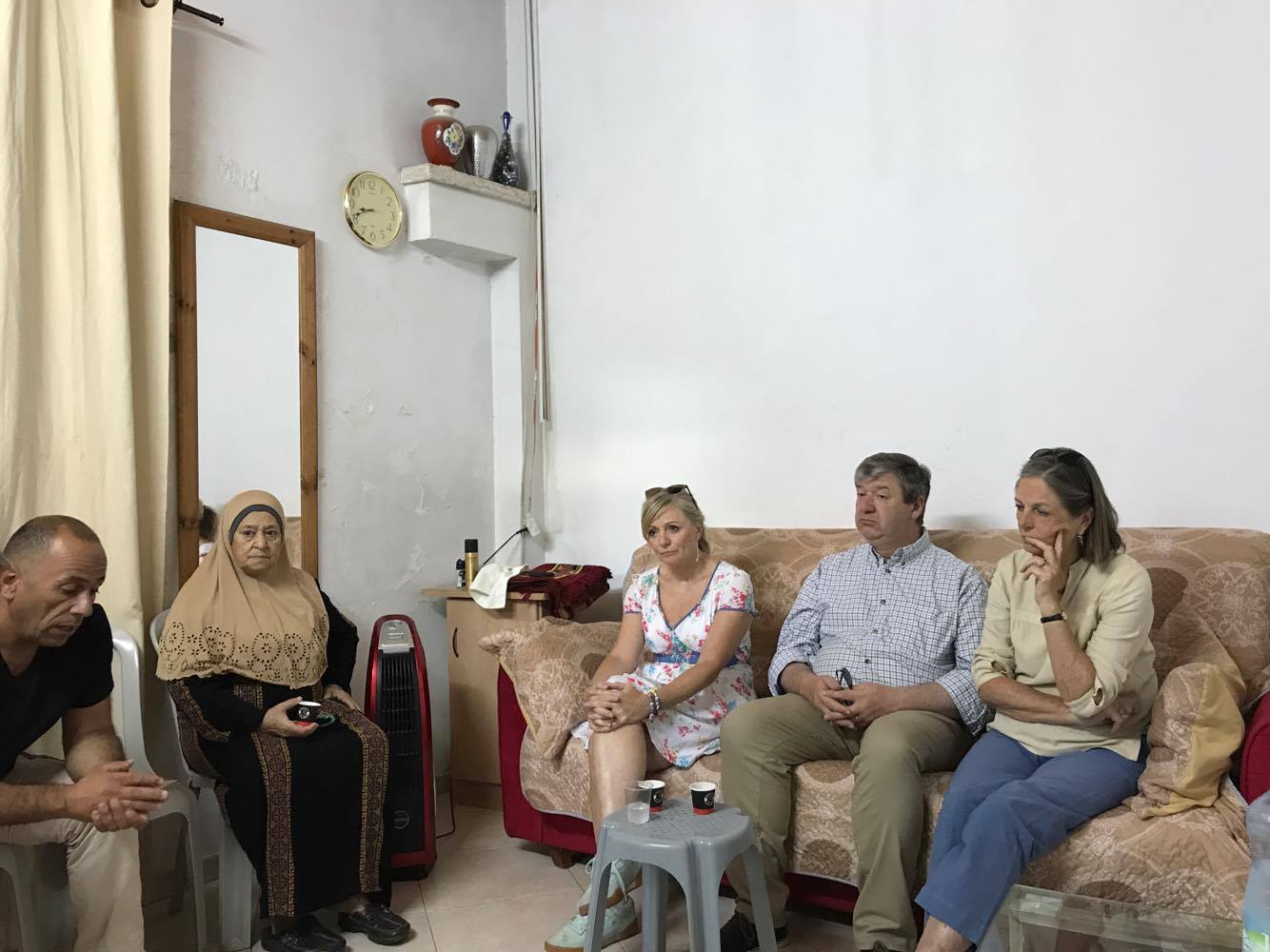
However, on 4 September 2017, Israeli police sealed off the surrounding streets and the Shamasneh family were evicted from their home by force in a large police operation, and Israeli settlers moved in. This was the first eviction of Palestinian families from the Sheikh Jarrah neighbourhood since 2009 and is part of further settlement plans and evictions there.
Before the creation of the State of Israeli in 1948, the land on which this Shamasneh family home is built on belonged to a Jewish family. This eviction, like those in 2009, are carried out in accordance with a law that allows Jews, but not Palestinians, to reclaim property or land that was owned pre-1948. A right-wing Israeli organisation made representations on behalf of the previous owners of the site in legal proceedings.
The Shamasneh family lost their appeal in the Supreme Court of their case in 2013 – lower courts ruled that the land should be given to its Jewish owner. At the time, the eviction of the Shamasneh family was deferred on humanitarian grounds – given that two members of the family are elderly. Proceedings to evict the family were renewed two and a half years after the appeal was lost and an eviction order served.
Foreign Office Minister Alistair Burt said that the UK Government considers “such evictions contrary to international law and they cause unnecessary suffering. The increased trajectory of evictions, demolitions and settlements in East Jerusalem undermines the prospects for peace.”
At least 180 households in East-Jerusalem, mainly in Sheikh Jarrah, Silwan, the Old City and Beit Safafa, are facing the threat of eviction from their homes.
Batan al-Hawa district of Silwan in Occupied East Jerusalem
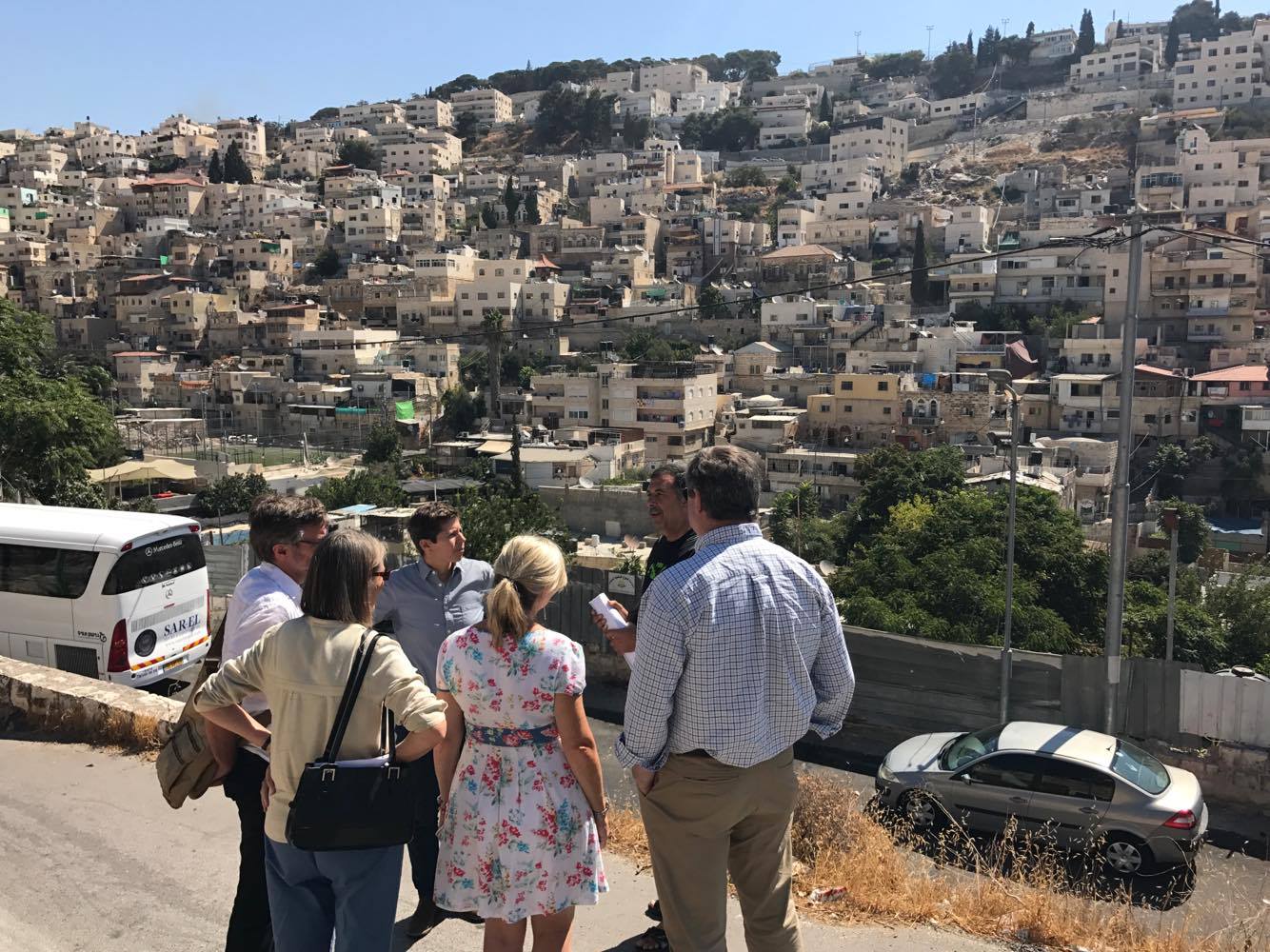
The neighbourhood of Batan al-Hawa in Silwan is, according to B’Tselem “the setting for the most extensive expulsion in recent years in East Jerusalem.” The delegation visited Batan al-Hawa and were shown around by B’Tselem volunteer Zuhair al-Rajabi. During the visit, the delegation saw a recently demolished home, and were also shown various houses that had been taken over by illegal Israeli settlers. These occupied homes are protected by private security guards, funded by the Israeli taxpayer, and receive support and protection from the Israeli police. Whilst the delegation was visiting, a settlement building in the heart of Batan al-Hawa was receiving food provisions from a group of Israeli police officers for the police or guards based there.
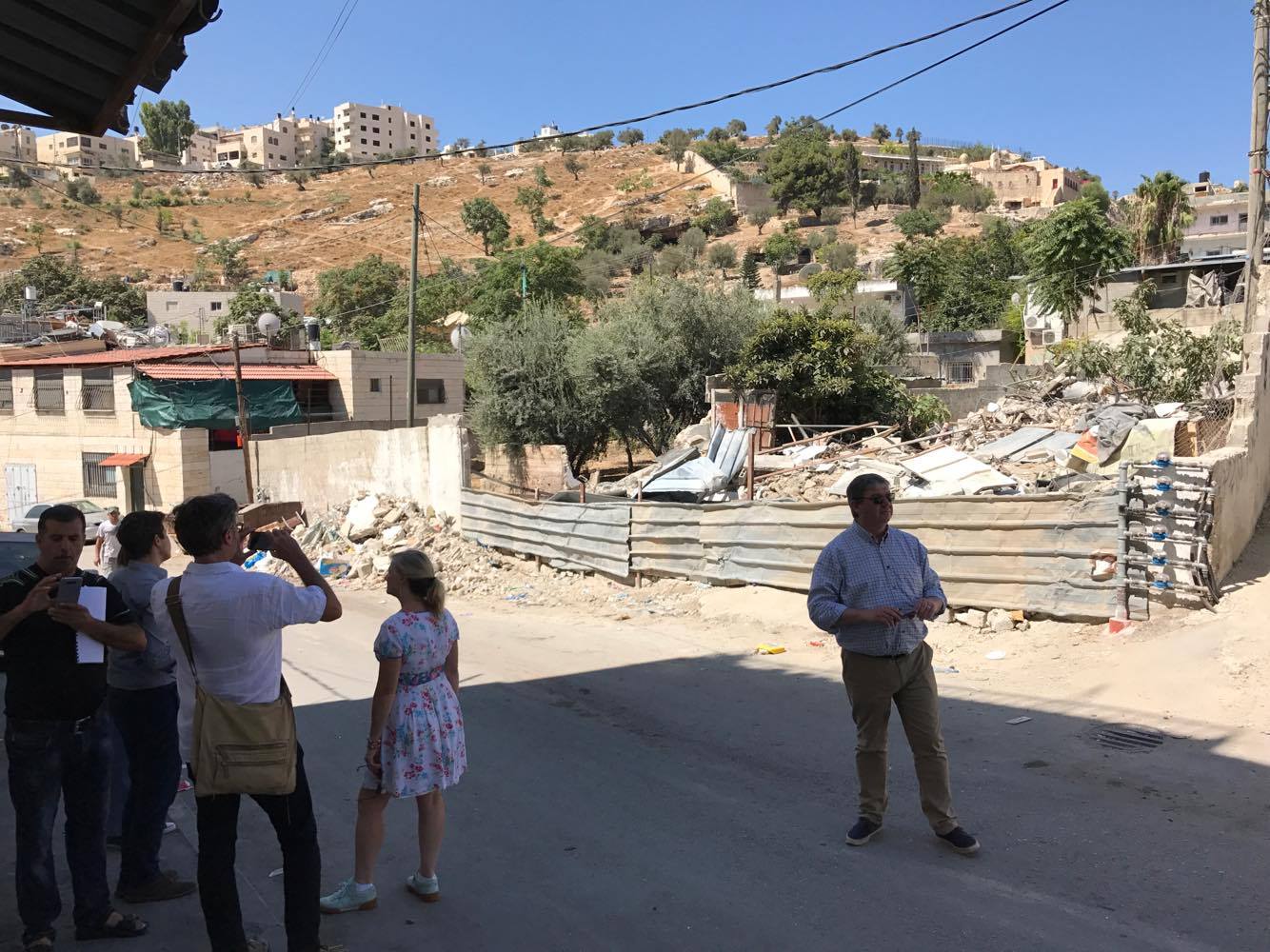
The Palestinian residents of Batan al-Hawa continue to face state-backed evictions led by settler organisations. The Ateret Cohanim settler association, backed by the Jerusalem Municipality and the courts, has been trying to evict 81 neighbourhood families and take over their homes. It has already taken over six buildings. Violence and tensions have been increasing in Batan al-Hawa, particularly because of the presence of illegal Israeli settlers in the heart of the neighbourhood and the protection of them from security forces and police. There was also unease over a dog which had recently given birth and had allegedly been fed by both Israeli police and settlers, and then encouraged to attack children in Batan al-Hawa.
Makassed Hospital, East Jerusalem
Medical staff from the Makassed Hospital in East Jerusalem and Physicians for Human Rights Israel (PHRI)briefed the delegation on the obstacles that hospital patients and staff face on a daily basis and obstacles placed on accessing the right to health in the occupied Palestinian territory.

They detailed access issues for patients from the West Bank, but also in particular from Gaza – including issues surrounding permits to be able to leave Gaza to receive treatment at the Makassed Hospital in East Jerusalem. Many of the hospital’s patients, and the medical teams that transport patients from the occupied territory, face difficulties getting to the hospital, which impacts both the health of the patients and the hospital operations. Physicians for Human Rights Israel also gave an analysis of various mechanisms that impede access to treatments for patients from Gaza and the West Bank, as seen in their extensive work on overturning permit decisions of the Israeli authorities.
The delegation was given a tour of the hospital’s neo-natal ward and was shown a two-month-old baby separated nearly their whole life from their mother who had to return to Gaza.

Hospital staff also described how Israeli forces raided the hospital on 21 July 2017, documented in a recent PHRI report. Police sought to arrest 20-year-old Muhammad Abu Ghanam who had been wounded by gunfire. His bed was seized and a doctor, two nurses and a volunteer nurse attempting to treat him, were assaulted. Attempts to resuscitate the man failed and he later died. More about this can be read here.
The delegation witnessed the damage to the wall of the Accident and Emergency entrance caused by tear gas canisters fired by Israeli security forces during this raid.
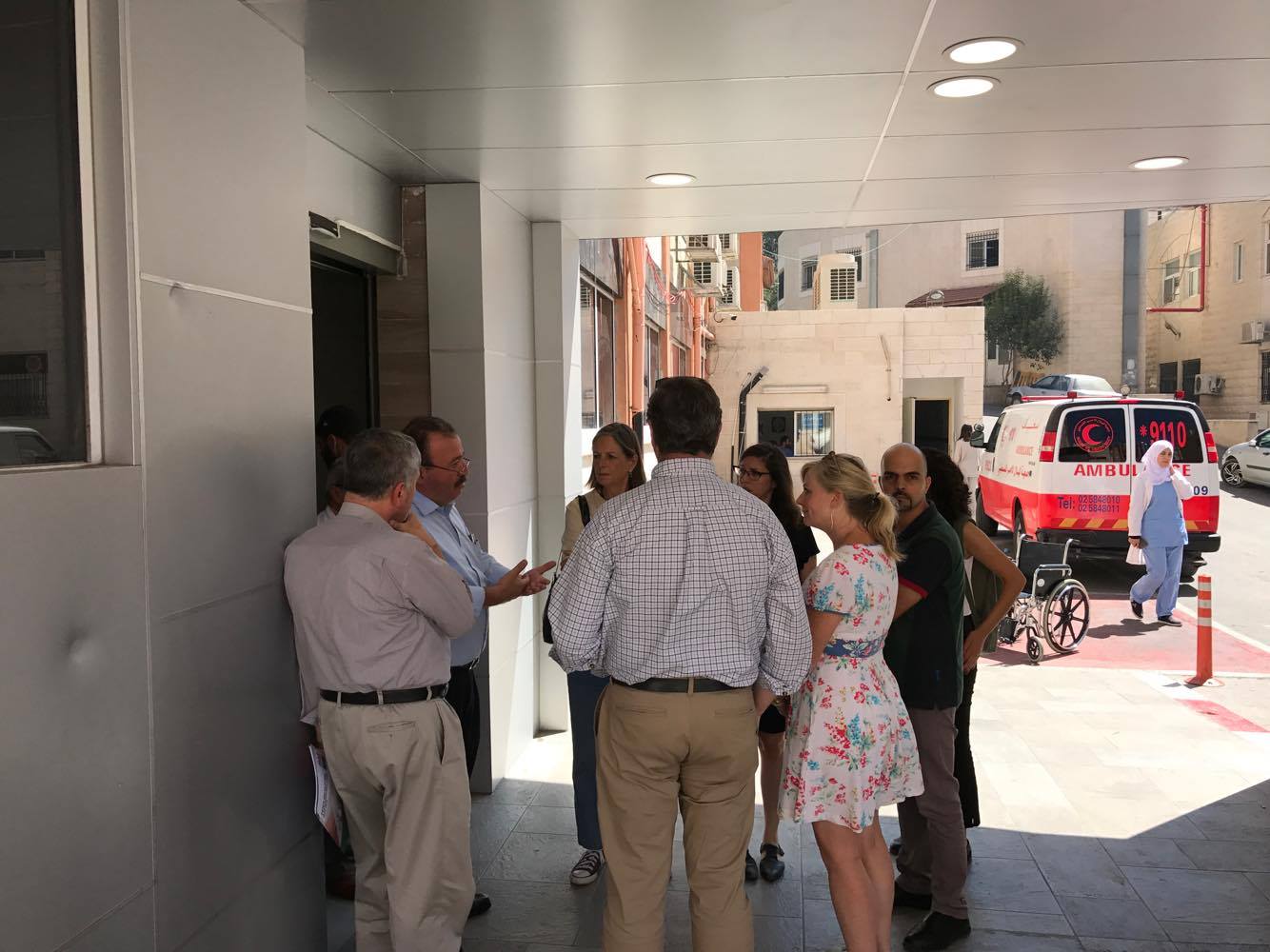
Saraya Centre, Old City of Jerusalem
Medical Aid for Palestinians funds several projects in the Saraya Centre in the Old City of Jerusalem. MAP and the Saraya centre work together to offer psychosocial support and after school activities for children living surrounded by settlers and within the violent context of living in the Old City. The delegation spoke to the staff and volunteers, who discussed the challenges they faced, including from settlers attempting to take over the centre. They also saw some of the activities with children who were preparing for Eid festivities.

Bedouin community of Fasayil in the Jordan Valley
Through Medical Aid for Palestinians’ mobile clinic, 27 isolated Bedouin communities in the Jordan Valley are provided with essential health care. The majority of the Jordan Valley is in Area C under full Israeli military control. Given the isolation and vulnerability of such communities, and that permanent health facilities cannot be built, the mobile clinic provides vital services.
One such community visited by the delegation was Fasayil. The delegation met with people using the service, mostly women with young children and the elderly. Pregnant women were provided with iron and zinc, as explained by the clinic’s Doctor Rohi (as seen in the video below). In Fasayil, there have been home demolitions and also the destruction of water pipes and also issues of land confiscation. Recurring demolitions of various structures in Palestinian villages located in Area C have been a longstanding and pervasive problem in the Jordan Valley.
Medical Aid for Palestinians are seeking £140,000 to buy a new vehicle that can be converted into a mobile clinic. The current vehicle has been on the road for 10 years and frequently breaks down. It can no longer travel off-road for long distances which it is required regularly to do.

The villages of Qaryut, Khirbet Sarra, Jalud and Burin in the Nablus area
With Palestinian NGO Al Haq and Swedish development organisation Diakonia, the delegation visited the villages of Qaryut, Khirbet Sarra and Jalud south of Nablus. They are surrounded by the illegal Israeli settlements of Shilo and Shuavat Rahel. They also visited Burin, which has the illegal settlement of Yizhar on one side and the illegal settlement of Bracha on the other.

In all of these communities, the close proximity to the illegal settlements means that tensions are very high, and there have been many attacks from settlers and intimidation, including on children going to school. One resident in Khirbet Sarra told the delegation how he always drove his children to school, even if the distance to Qaryut was relatively short, because of the intimidation they would face. On land expropriated from Palestinians in Khirbet Sarra, between the Israeli settlement and the road, was a line of kennels with guard dogs, designed to intimidate and frighten the villagers. On occasions, these dogs have been released on villagers. There are also reports from Khirbet Sarra of how pigs have been used by Israeli settlers to destroy crops on Palestinian land.
The Israeli settlements continue to expand and encroach on these villages, expropriating natural resources including land and water. Tensions are particularly high during the harvest season. In Qaryut, the delegation visited a Palestinian olive grove which is on the opposite hill to a settlement. Farmers from Qaryut are constantly prevented from accessing this land with grave detrimental impact not only in terms of security but also of livelihood. Olive trees are often destroyed by Israeli settlers.
The delegation spoke to local activists in Burin. They spoke of settler attacks on villagers, in particular farmers, and how the Israeli settlers were protected by Israeli soldiers and Israeli settlement policies, demonstrating the control that settlers had. In cases where Palestinians were attacked by Israeli settlers, nothing had been done to help them. The settlers had not been arrested, detained or held accountable for their actions. Read this from Al Haq from 2015 about Israeli settler attacks in the West Bank.
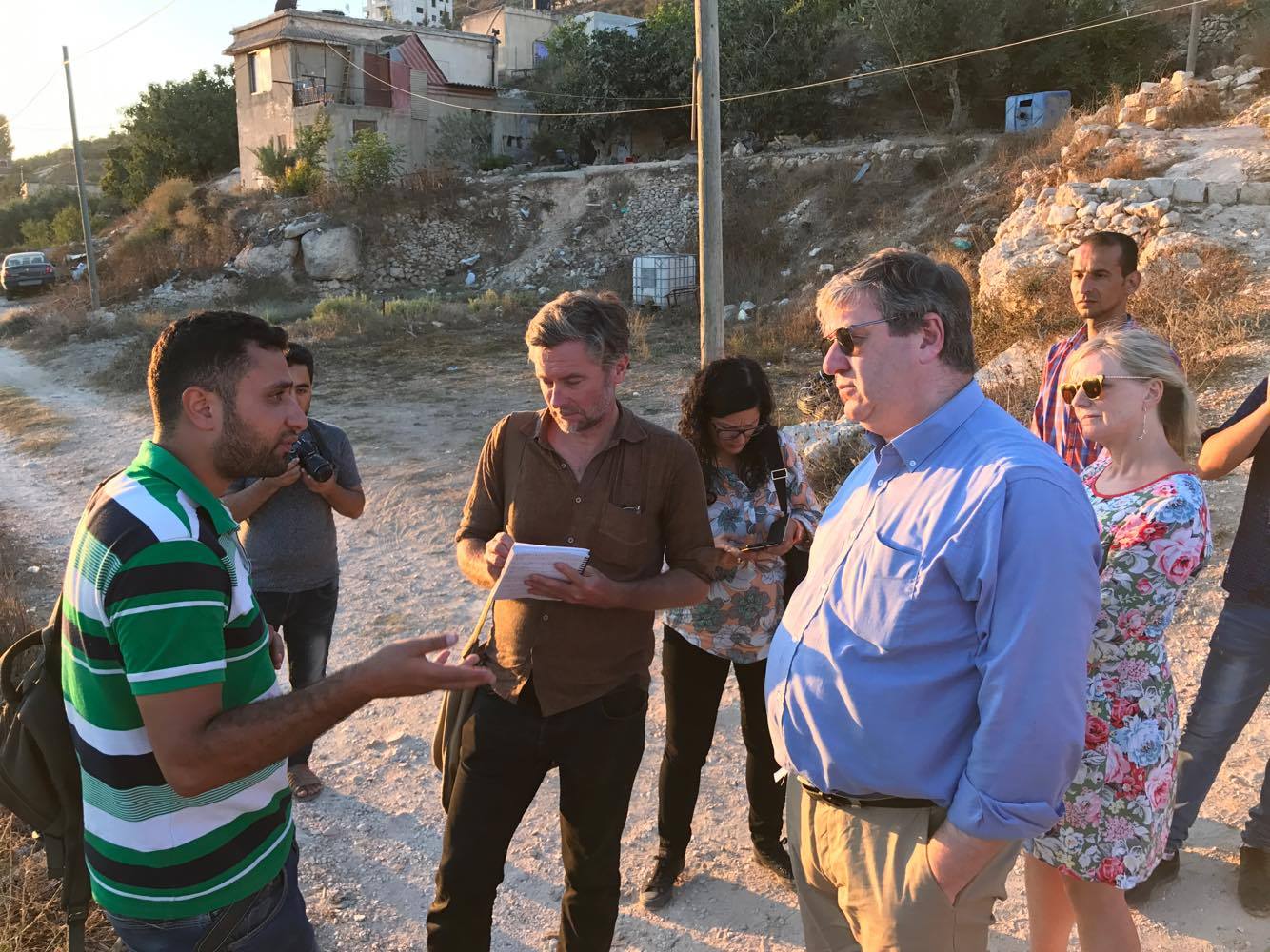
Hebron
The delegation visited Hebron with the Israeli organisation, Breaking the Silence – a group of former Israeli soldiers.

The delegation were given a walking tour of Shuhada Street in the historic centre of the city which is under full Israeli military control. The tour began near Hebron’s Ibrahimi Mosque. Throughout the tour of what was once Hebron’s most vibrant and lively street in its historic centre, which included fruit, vegetable and meat markets and the city’s bus station, the delegation encountered a ‘ghost town.’ The front doors to many homes and shop fronts have been welded shut preventing access from the front. Some of doors and frontages of Palestinian homes had been daubed with graffiti, including some that stated “Death to Arabs” and “check them when they exit”. Much of Shuhada Street is termed a ‘sterile zone’, preventing Palestinians from walking down it although illegal Israeli settlers in Hebron have full access to walk and drive down Shuhada Street. Throughout the historic centre around Shuhada Street there are numerous checkpoints, controlling access to other areas of the city of Hebron.
The visit to Hebron finished in Tel Rumeida, with a visit to Palestinian human rights defender Issa Amro and to the organisation which he founded, Youth Against Settlements, a non-violent Palestinian organisation that seeks to end the building and expansion of illegal Israeli settlements.
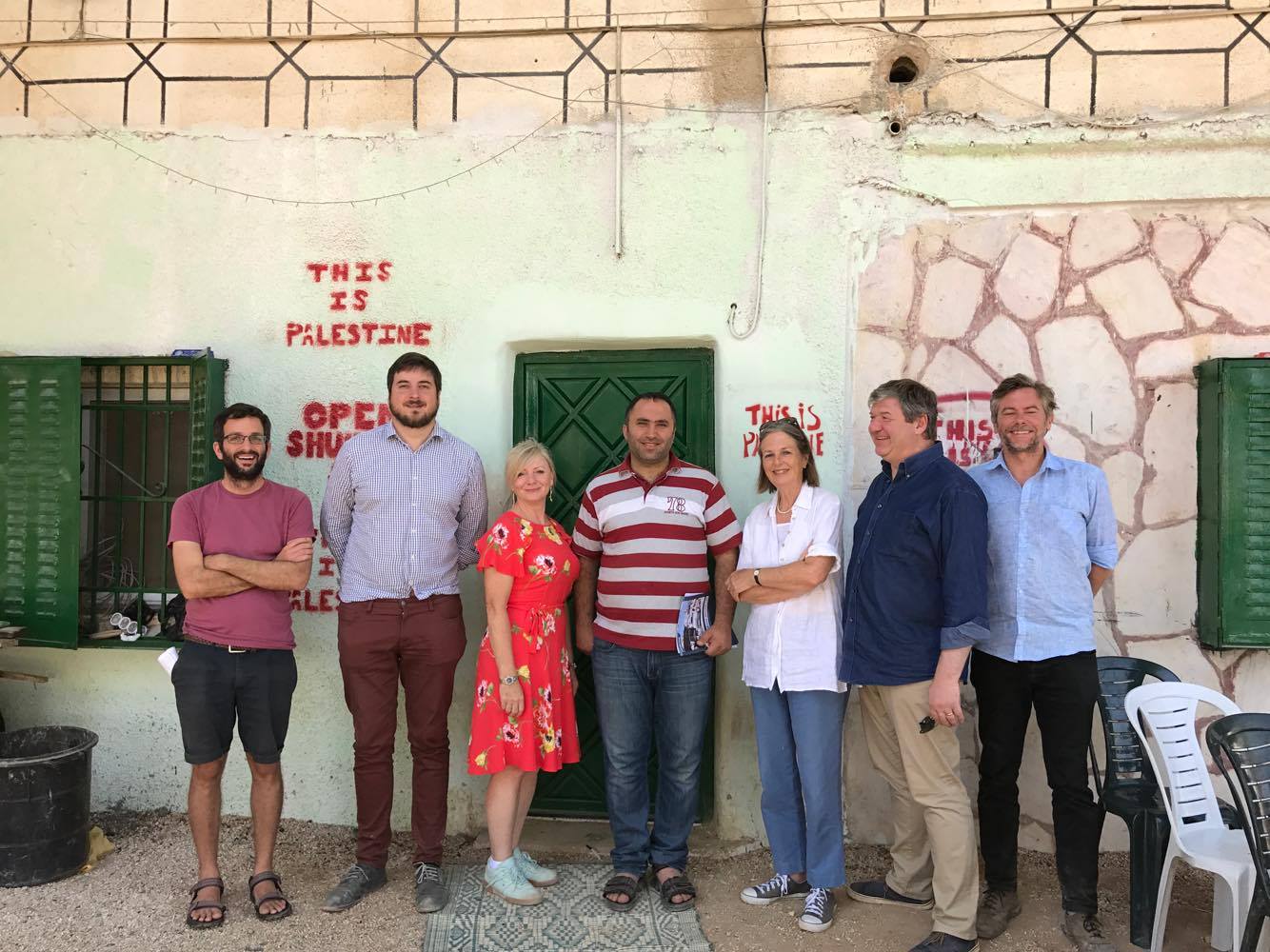
Amro, who has documented alleged abuse by Israeli soldier and settlers in Hebron and faces Israeli charges for his non-violent activism, was arrested by the Palestinian Authority (PA) a few days after meeting the delegation. He was arrested and charged with disturbing “public order” and “insulting the higher authorities” for a Facebook post critical about the arrest of a journalist. Amro was later released on bail. The delegates wrote to the Palestinian Authority about Issa Amro’s arrest. You can see some of their comments and Caabu’s statement here.
Susiya in the South Hebron Hills
The community in Susiya remains under threat of demolition. All the buildings in Susiya have demolition orders placed upon them by Israel. Its Palestinian residents are threatened with forcible transfer. Active and sustained campaigns to protect the village from demolition continue. The delegation spoke to the community including key activist and resident Nasser Nawaja. The delegation, who visited with Breaking the Silence, was briefed on the impact of the nearby settlement. Susiya is home to 32 Palestinian families numbering some 200 persons, including 93 minors. It has a council structure, a clinic, a small preschool and a school for grades one through nine, which serves 55 children.

Israeli Defense Minister Avigdor Lieberman said in August 2017, that the ministry was preparing for the evacuation of Palestinian communities built without ‘authorisation’ and that work was being done to implement plans to evacuate Susiya in the South Hebron Hills and Khan al-Ahmar in E1 within a few months. (Read this press release from B’Tselem here.)
Aida Refugee Camp in Bethlehem

The delegation visited the Lajee Center, in Aida Refugee Camp in Bethlehem. Lajee was established in 2000 by a group of eleven young people from the camp. The main aim of the Lajee Center is to provide refugee youth with cultural, educational, social and developmental opportunities. The Center finds itself under frequent raids from Israeli soldiers, with Aida Camp serving effectively as a training ground for soldiers given the inevitable clashes between them and young Palestinians.
Difficulties faced by the camp’s residents were discussed with Salah al-Ajarma, the director of the Lajee Center, who also gave the delegates a tour of the camp, including of the Wall. Specific issues regarding Palestinian refugees from 1948 were discussed.
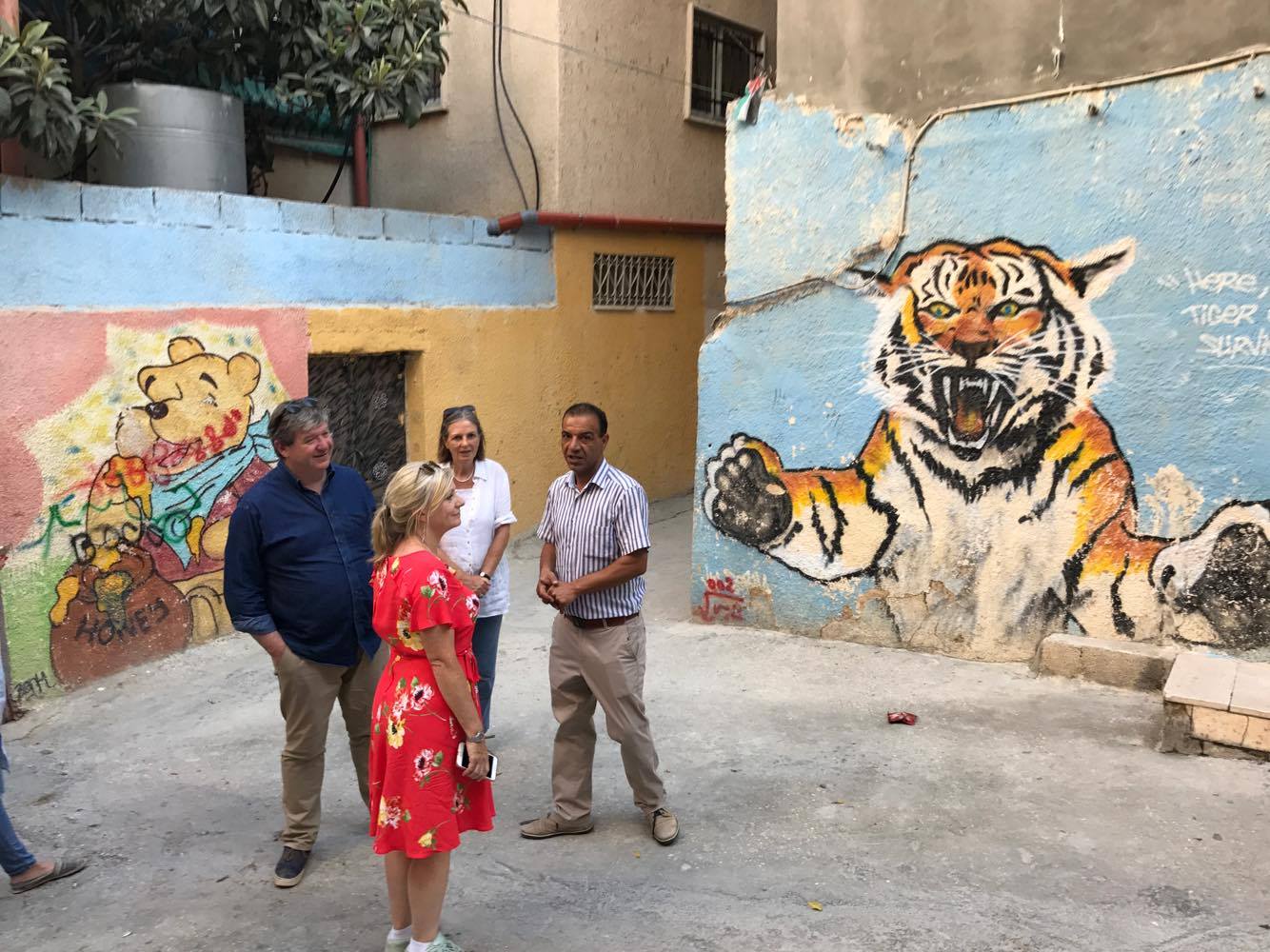
In August 2016, an online campaign was launched after Celtic FC was fined for waving Palestinian flags by UEFA. The campaign was to match the fine, however over £176,000 was raised, with both the Lajee Center and Medical Aid for Palestinians being the recipients of the donation. Here is a video from August 2016 of young people from the Lajee Center thanking Celtic fans.

